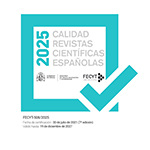Infancia y Confinamiento. Prácticas Espaciales de Resistencia
Resumen
Este estudio presenta una reflexión sobre la relación entre espacio, juego e infancia y la capacidad de reinventar contextos a través de una propuesta de prácticas espaciales. El principal objetivo consiste en identificar aquellas cuestiones espaciales ligadas a la experiencia del habitar en la infancia que determinan espacios comunitarios de esparcimiento y aprendizaje. La propuesta, realizada a partir de una experiencia personal, surge de la observación de las nuevas formas de ocupación del espacio doméstico habitual de dos niñas de 3 y 5 años tras la situación de confinamiento decretada en marzo de 2020 debido a la pandemia del Covid-19. En esta situación, la vivienda se reinventa a través de pequeñas intervenciones efímeras configuradas mediante la combinación de patrones espaciales sencillos que las niñas y niños manejan con soltura, proyectando lugares de protección y experimentación que responden a sus necesidades de forma instantánea. Estas prácticas de resistencia permiten cuestionar las funciones del espacio doméstico, y por extensión, del espacio urbano, poniendo en evidencia la necesidad urgente de proyectar nuestras viviendas y espacios urbanos en términos de cuidado y sostenibilidad, desde una perspectiva feminista y comunitaria que integre la mirada y experiencia de la infancia en el proceso de diseño.
Descargas
Descarga artículo
Licencia
La revista Arte, Individuo y Sociedad, para fomentar el intercambio global del conocimiento, facilita el acceso sin restricciones a sus contenidos desde el momento de su publicación en la presente edición electrónica, y por eso es una revista de acceso abierto. Los originales publicados en esta revista son propiedad de la Universidad Complutense de Madrid y es obligatorio citar su procedencia en cualquier reproducción total o parcial. Todos los contenidos se distribuyen bajo una licencia de uso y distribución Creative Commons Reconocimiento 4.0 (CC BY 4.0). Esta circunstancia ha de hacerse constar expresamente de esta forma cuando sea necesario. Puede consultar la versión informativa y el texto legal de la licencia.










